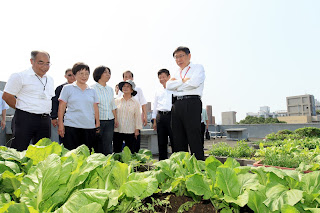Act Up! City Farmers
In 2015, Taipei mayor Ko Wen-Je(柯文哲) pulled off the “Farm City” project, one of his most important platforms during the election, at the capital city of Taiwan.
Four years have passed, has he successfully paved the way that brought nature back into the city?
Managing a mega city like Taipei is a conundrum even for the most brilliant mayor. With more than 6 million habitants living in Taipei-New Taipei metropolis, heavy traffic and frequent gridlocks in our daily scene remind all of us of a terrifying truth: our city is chocking.
(Right) Taipei Mayor Ko Wen-Je
The wasted gas derives from motor vehicles and suburban factories is the reason why.
The particulate air pollution allegedly causes 3.2 million premature deaths annually, in both rural and urban area worldwide[1] As a plethora of urban policies was raised to tackle this rising threat, such as the diesel cars ban[2] and the subsidy of public transportation,[3] greenery is proved to be the most cost-effective and beneficial.
Air pollution is no longer an invisible threat*1
Nature does offer remarkable benefits to a city.[4]
“This farm is definitely an invaluable asset for the district,” said Felly Tsai, a 66-year-old retiree living in Songshan District, Taipei. “It is a communal area for neighbors to mingle with and to know one another better. People also felt delighted to know where the food on their dining table comes from.” She volunteers at the “Happiness Farm”, one of the most visited and prosperous farms under the Farm City project.
Most residents recognize these city farms as a non-toxic food source and recreation places for the neighborhood and more examples like this are emerging on the rooftops of public buildings and schools around the whole city. Nevertheless, the limit of the change that these farms could bring to the city also gradually well up.
Abut the concrete jungles lie the precious green patches
(Source:Taipei City Construction Management Office)
“Initially, this project was directed to provoke the community awareness and to beautify the city,” said Shilun Huang from Napcufarming, an NGO that lobbied this Farm City project during the mayoral election.
This phenomenon seems to explain why this project hasn't revolutionized our street views. Not to mention to a degree that the additional greenery could contribute to purify our air quality.
Until recently, only limited farms were successfully led and built by the citizens and the intervention from the government seems still indispensable.
Any lofty chance for the buoyant shopping streets?
Even so, on the other side of the world, a group of green fingers is currently leveraging their inherited aesthetic consciousness and civic awareness to transform the most romantic city in the world into a verdant cosmopolitan hub.
The French capital of Paris chose to coordinate with its citizens against the urban environmental crisis. Le permis de végétaliser, that is, the license to vegetate, is an initiative that encourages Parisians to treat the entire city as their own gardens.
Before 2030, the city hall aims to plant 20,000 new trees and roll out 100 hectares of vegetation across the city’s street corners, walls, and rooftops with the shared efforts from its residents.
In order to procure the license, there are several steps to follow[6]:

1. Choose a public space, such as the façade of municipal amenities, sidewalk tree bases, or even bus shutters with the ideal plants you would like to plant.
2. Sign a “vegetation charter” to ensure the commitment of ecological gardening is guaranteed: weed manually and never resort to the pesticide.
3. Once the plan is approved, usually within one month, gardeners will receive a kit in which seeds and potting soils are provided.
4. Voilà, you are on your right to vegetate your favorite spot as you want.
*2
“Besides the closer relations among neighbors, the unlimited creativity from the citizens is what surprises us the most,” said Pénélope Komitès, leader of the green spaces department in Paris City Hall. “The dose of greenery not only brings the city to life, but also helps to allay the unbearable summer heat derived from global warming, air pollution, and increasing population in Paris.”[7]
Given more freedom from the municipality to decide where and what to plant, the plantation in Paris is no longer restricted to certain designated spaces like parks or schools by really spread out to the entire city and enter everyone's daily life. This scene is what we still extremely lack in Taipei.
Even though the freedom sometimes indicates the potential aesthetic crisis (e.g. abandoned pots beside the roads because of vandalism or carelessness), people will always bring the remarkable results when they own the chance to make the best out of their city.
Greenery means more than planting more trees, the approaches being taken and the motivation of participants also determine its outcome. Above all, we all wish to live in a city where the air is fresh, the temperature is moderate, and plenty of green is enjoyed by all the residents.
Most importantly, it is the city we proudly created together.
By Chris Chang x Green News Taiwan









Comments
Post a Comment